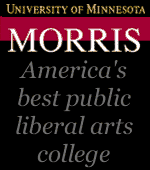A cruel present
Chris Clarke has been reading a gift book: an A Beka Book, one of the worthless creationist texts that the UC system refuses to accept for credit. Ever wonder why?
"The sequence of study found in all other current biology texts can implant a subtle evolutionary philosophy in the students' minds. The Christian teacher will find that the unique A Beka Book approach to biology eliminates the conflict which results when evolutionary philosophy is combined with truth. Students and teachers alike will feel more comfortable when they realize that it is not biology that is in conflict with Scripture, but rather the ungodly philosophy of some biologists."
So reads the prologue of Biology: God's Living Creation, sent to me as a gift by a friend with a disturbing sense of humor. The controversial textbook - and here I use "textbook" to mean "cruel practical joke played on unsuspecting high school biology students" and "controversial" to mean "filled with lies" - made the news recently when a group of Southern California fundamentalists sued the University of California over UC's refusal to credit biology classes for which the book served as text. The UC regents were right to so decide: the book is garbage.
From there, he dissects one of those persistent delusions, that there is a ladder of creation with us at the top. There, it's not just creationist drivel that peddles that notion—there is a ghastly sum of verbiage wasted in legitimate biology texts trying to find a metric or somehow justify putting humanity on a pinnacle. It's never convincing. What nature generates is variety, not a ranking system.
We are one species among millions, one flimsy twig in a forest. The whole history of the biological sciences has been confirmation and reconfirmation of this fact. Copernicus and Galileo took us from the center of the universe. Thousands of biologists still work to dethrone us from the seat we had long usurped at the head of the table of life. This is a planet of bats and rats, of sparrows, of beetles and ants, but mainly - to a first approximation - this is a planet of bacteria. One could call us an afterthought, if one granted that thought played a role in our steppping onto life's stage, which I do not. I find this point of view exhilarating, like looking at a starry sky and imagining the impossible distances. There is grandeur in this insignificance. There is an imperative not to take more than our share.
Hear, hear. What a shame that so many kids' minds are constrained by the puerile piddlings of Scripture rather than the messy, complicated, expansive glories of the whole universe.


Yet another reminder why it is worth checking "Creek Running North" on a regular basis!